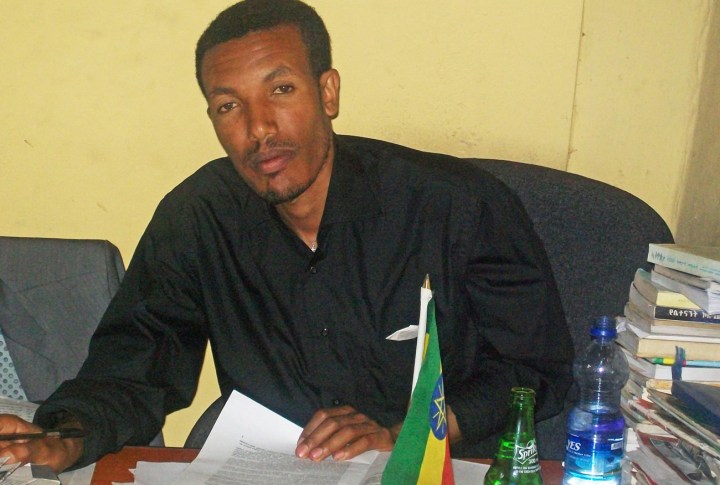Media
Ethiopian journalists charged with terrorism in government media crackdown

In a wide-scale attack on freedom of speech, Ethiopian police have arrested local and foreign journalists, in a sweeping effort to silence media criticism. Being a journalist in Ethiopia was never easy, but now that the authoritarian and repressive Ethiopian government is labelling media workers “terrorists”, the job is becoming almost impossible. By MANDY DE WAAL.
“I fully trust my husband. He is a responsible person. He never involve on such thing. He believes in rule of law. He respect(s) the constitution. I (am) proud of my husband”
Those were the words of Berhan Tesfaye Taye, the wife of Ethiopian journalist Woubshet Taye, deputy editor of Arwamba Times, one of Ethiopia’s last remaining independent and critical newspapers, who was taken away from his family and work and imprisoned on vague complaints three months ago. On Tuesday the Ethiopian government laid a damning charge of terrorism against him.
Speaking to Bloomberg, Awramba Times’ editor, Dawit Kebede said that Taye’s innocence in the matter was unquestionable, and the move was aimed at putting systematic pressure on Arwamba Times.
In March this year, Kebede spoke to Daily Maverick about the appalling conditions in Ethiopian prisons, a place where he spent 21 months in an overcrowded cell with 350 other inmates. Kebede was jailed for speaking out against Prime Minister Meles Zenawi’s government. Unbowed, within days after his release, Kebede resumed his criticism of Ethiopia’s government.
In an email to iMaverick, Kebede said Taye was detained for being critical of Zenawi’s ruling Ethiopian People’s Revolutionary Democratic Party. Kebede said Taye’s family had been left destitute, but the Committee for the Protection of Journalists was assisting with his colleague’s legal defence. “He is really a dedicated and committed journalist,” Kebede wrote in his mail. “He is not only my colleague, but also my friend for the last 11 years. We regularly visit him.”
Kebede asked South African journalists and media organisations to do whatever they could to lobby for Taye’s release. He also appealed to volunteer workers to come forward to assist the arrested journalist’s wife.
The CPJ reports that Taye was arrested in mid-June with Reevot Alemu, a columnist for Féte, a weekly Amharic newspaper. CPJ says both journalists were initially held incommunicado. “The anti-terrorism law criminalises writing (which) the government deems favourable to groups and causes it labels as ‘terrorists’, including banned political opposition party Ginbot 7. This is the first use of the law against journalists,” CPJ said in a recent statement.
The move is part of a larger, sweeping action by government to silence critical news and dissent. Voice of America reports that on Wednesday Ethiopian federal police rounded up independent Internet journalist Eskinder Nega along with political opposition activists, while news from Bloomberg is that Elias Kifle, a journalist with the Washington-based Ethiopian Review, was detained along with two Swedish journalists (Johan Persson and Martin Schibbye).
Speaking to Bloomberg the state minister of communications, Shimeles Kemal, said prosecutors had video evidence of the two Swedish journalists handling guns. Arrested with members of the Ogaden National Liberation Front, the Swedish journalists are charged with entering the country illegally, assisting a terrorist organisation and engaging in terrorism.
In related news, CPJ confirmed the first instance of a journalist threatened by a government after being identified in a diplomatic cable disseminated by WikiLeaks. The name of an Ethiopian journalist was given in US diplomatic cables leaked by the whistleblowing website last month, although the journalist’s government source was not identified.
“On 5 and 6 September, officials from Ethiopia’s government communication affairs office (GCAO) summoned journalist Argaw Ashine to their offices in the capital, Addis Ababa, with his press accreditation. He was summoned because he had been cited in a 26 October 2009, cable from the US embassy in Ethiopia regarding purported GCAO plans in 2009 to silence the now-defunct Addis Neger, then the country’s leading independent newspaper. On 8 September Ashine was summoned again, this time by police, who interrogated him and gave him 24 hours to either reveal the identity of his source at the GCAO office or face unspecified consequences,” the statement from CPJ read.
Ashine, chairman of the Ethiopian Environment Journalists Association, and deputy chair of Ethiopia’s Foreign Correspondents’ Association, fled from Ethiopia shortly afterwards.
“The threat we sought to avert through redactions of initial WikiLeaks cables has now become real. A citation in one of these cables can easily provide repressive governments with the perfect opportunity to persecute or punish journalists and activists,” Joel Simon of CPJ said. “WikiLeaks must take responsibility for its actions and do whatever it can to reduce the risk to journalists named in its cables. It must put in place systems to ensure that such disclosures do not recur.”
The 2009 US embassy cable states that Ashine had cited an undisclosed official source from Ethiopia’s government communication affairs office who said authorities “had drawn up a list” of top newspaper journalists “who they plan to target to silence the newspaper’s analysis”. DM
Editor’s note: Civic, media or volunteer organisations that might be in a position to assist in offering support to Woubshet Taye and his family can call his lawyer Derbew Temesgen on +251911624362.
Read more:
- Two Swedish Journalists Charged With Terrorism in Ethiopia, Minister Says in Bloomberg;
- Government Critics Detained In Ethiopian Anti-Terror Sweep at Voice of America;
- Dawit Kebede, Ethiopia’s courageous, defiant editor in Daily Maverick.
Photograph of Woubshet Taye courtesy of Dawit Kebede, Arwamba Times



















 Become an Insider
Become an Insider